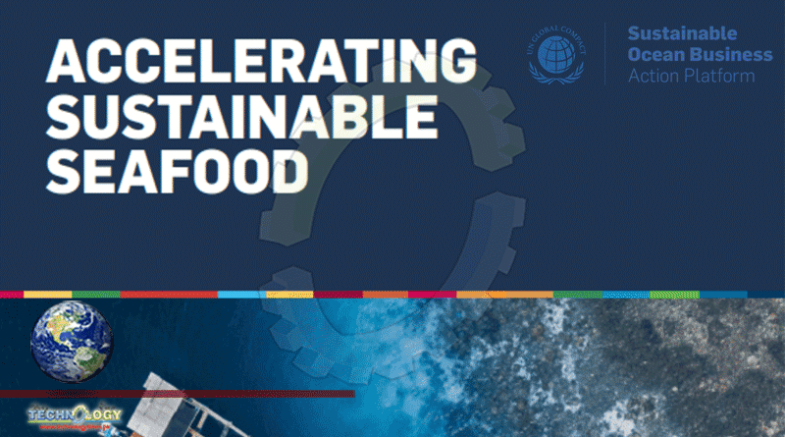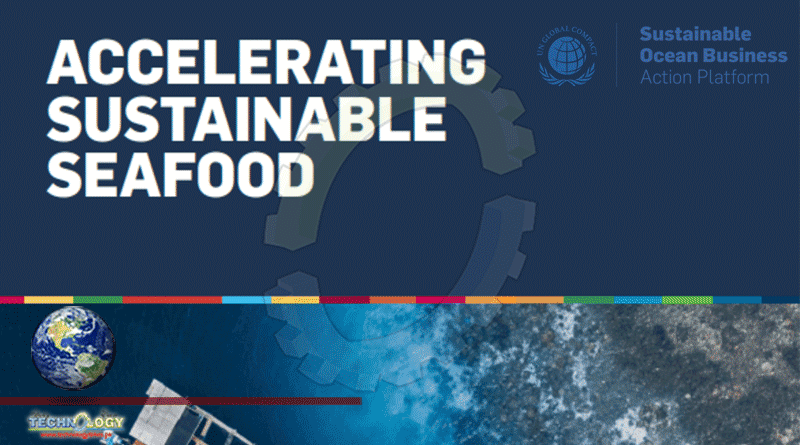2021 Represents A Unique Opportunity For The World To Accelerate The Development Of Sustainable Seafood Production

Six ways of helping to ensure that the global seafood industry – covering both fisheries and aquaculture – become more sustainable were outlined in a new report which has been published by the United Nations this week. Called Accelerating Sustainable Seafood, the report was based on the outcome of a ‘sprint’ convened by the United Nations Global Compact Action Platform for Sustainable Ocean Business. Over three calls, 50 stakeholders from policy, business, science and finance discussed how the sustainable development of the seafood sector can be accelerated. The first meeting focused on the role of measurement, including the tools and means to enable effective comparison of seafood companies. Participants discussed “how new forms of sustainability assessments have enabled a ‘race to the top’ between companies, in turn, accelerating the sustainable development of the seafood industry”.
The second meeting focused on the role of finance and how both traditional and innovative financial mechanisms can play a key role in driving the sustainable development of the seafood industry. Financing sustainable seafood, the report argues, “means both unlocking private and public capital towards sustainable projects as well as acting as important ‘gatekeepers’ to ensure investments are directed towards more sustainable practices and decent working conditions”. The final meeting focused on the role of policy and regulatory frameworks in creating a level playing field for the seafood value chain. The meeting heard from several recent policy case studies which demonstrated ambition.
Throughout all meetings, there was one resounding theme: shifting towards sustainability will require a collective and collaborative effort across the entire seafood value chain “Throughout all meetings, there was one resounding theme: shifting towards sustainability will require a collective and collaborative effort across the entire seafood value chain,” the authors note. “With both the UN Food Systems Summit and the 26th UN Climate Change Conference (COP 26) taking place this year, 2021 represents a unique opportunity for the world to accelerate the development of sustainable seafood production,” they add.
-
The six ways identified by the UN
-
Ratification, regulatory compliance and meta-governance
The first involves the improved utilization and ratification of existing frameworks. Ratifying international conventions — such as the 2016 Agreement on Port State Measures (PSMA) and the C188 Work in Fishing Convention, 2007 (ILO 188) — are paramount in the fight against IUU. Harnessing their supporting instruments and utilizing meta-governmental frameworks, such as the FAO Code of Conduct for Responsible Fisheries 1995, as well as dedicating adequate resources to ensure compliance with existing national regulations are essential to enabling a global push towards sustainable seafood. Finance and business can support this by utilizing international standards and conventions as references when financing projects.
-
Ensuring a socially sustainable seafood sector
The second concerns ensuring a socially sustainable seafood sector, where the fight against IUU fishing remains closely linked to human rights. As trends towards mandatory human rights legislation meet increasing investor demand for the ‘S’ of ESG (environmental, social and governance), seafood companies can prepare by harnessing existing benchmarks while certification and labelling schemes can expand their focus to include social sustainability dimensions. Financial “gatekeepers”, from stock exchanges and creditors to insurance companies and private equity, can leverage their power and influence sustainability by deciding what to finance and under which conditions
-
Unlocking sustainable finance
Thirdly, unlocking sustainable finance will be key to supporting leadership and performance. This requires the right enabling environment, resulting from partnerships with multilateral banks, the incorporation of non-financial sustainability factors into the financial system and the continued analysis of how social-ecological risks translate into financial risks. Financial “gatekeepers”, from stock exchanges and creditors to insurance companies and private equity, can leverage their power and influence sustainability by deciding what to finance and under which conditions.
-
Ensuring access to high-quality, standardized nonfinancial data
Fourthly, access to high-quality, standardized nonfinancial data remains a critical bottleneck. Quality data throughout the value chain is important to inform decision making, both within companies and for investors assessing the sustainability of individual companies and sectors. To foster an environment of corporate data disclosure, there is scope for enhanced mandatory non-financial reporting throughout the supply chain, in close collaboration with producers and processors. ESG benchmarks and indices, which are useful in enabling comparisons between companies, could be further strengthened through standardized industry reporting agreements on key performance indicators (KPIs), such as in the Global Salmon Initiative (GSI).
-
Beyond transparency: from quantifying progress to rewarding performance
However, transparency and data alone do not necessarily equate to performance. Moving beyond disclosure, quantifying progress and rewarding performance are important next steps to accelerate the sustainable development of the seafood industry. Here there is a need to develop standardized tools which take the entire value chain into account and enable companies to track and quantify progress made against commonly defined science-based targets.
-
Recognising seafood within sustainable food systems
The sixth concerns the importance of recognising the present and future role of seafood in global food systems. The upcoming UN Food System Summit, scheduled for 2021, is an opportunity both to catalyse the cross-governmental coordinated action needed to holistically bridge food production with nutritional needs and strengthen the political recognition of seafood. Reframing seafood and unlocking all identified enablers will require a fundamental shift in global narrative and mindset. This shift, which includes the need to cement unsustainable practices as a fundamental business risk, will demand the collective and collaborative effort of all systemic shapers. Collaborations, such as in the UN Global Compact Action Platform for Sustainable Ocean Business, show there is a willingness to rise to the challenge from the seafood industry, the authors conclude.
This news was originally published at The Fish Site
